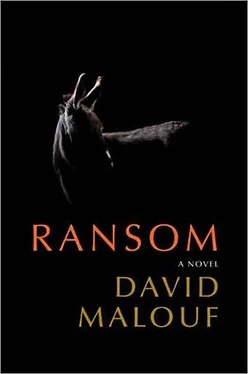Concealing the repugnance she feels, she once more gives him the whole of her attention, but with real fear now of this mood that is on him, and of the even darker places he may lead her into.
‘So,’ he resumes, but with an irony in his tone that she recognises (she has heard it many times before, but only now sees the force of it), ‘I was restored. When I slipped back into my old place in the world it was in a ghostly way and under a new name. As a substitute. For that little prince Podarces of whom nothing more would be heard or known. Except that I know him, I lived the first six years of his life. And many times over, in the darkness of my thoughts, as he predicted, I have made my way down into the underworld and sought him out, that small frightened child. To ask if he mightn’t have some message for me, since he suffered my first death.
‘A king, as you know, has to act in full assurance of what the gods have called him to, his high place in the world. He acts in the realm — that too is his kingdom — of the seen. But in my case the gift was a doubtful one. It was given then taken back again, and only in a joking, left-handed way restored. In me the assurance, the inner assurance, was lacking. Well, that is my affair. I have never spoken of it till now, even to you, my dear — though I expect you have sometimes wondered — and I hope that to others at least I have given no sign that there might be this, this lack in me. I have always, to the public view, been just what I appear to be. That is the discipline of kings. But to achieve it I have had to be more rigid than others. A little too punctilious, I know, in all that is due to ceremony. A stickler, as they say. For form, for the rules.
‘All that belongs to the outward view. But there is also an inward view,’ and he falls silent a moment, as if for this view there might be no words, as there is no visible form, and she must catch what she can of it from what she can feel out in his silence.
‘Well, as I said, none of that concerns anyone but myself and I’ve tried never to let it show. It’s of no account what I happen to be feeling at any moment in my actual person — whether I have the toothache, or a belly swollen from eating too many peaches, or am raging with anger or impatience or desire — so long as I sit still and fill a space towards which others may look in reverence. So long, I mean, as I create the proper illusion. Only I know what it costs to be such an object. To rattle about like a pea in the golden husk of my … dazzling eminence. Never for even a moment to wobble or look flustered, or let the impressive effect be shaken by so much as the twitching of an eyelid or — god forbid! — a yawn. Or, in these latter days of my old age, by the trembling of a hand. I’ve played my part, and tried to let nothing peep out of the real man inside so much empty shining. I did it out of defiance of the gods, as well as in fearful reverence for them. In defiance of the fact that their first choice, all those years ago, was against me, as perhaps they have chosen against me a second time in this business of the war, so that I have now to be ransomed a second time — to ransom myself, as well as my son. By going to Achilles, not in a ceremonial way, as my symbolic self, but stripped of all glittering distractions and disguises, as I am. ’
He sits with his hands clasped between his knees, suddenly weary. Hecuba too is silent. At last she sets her hand very gently on his shoulder and says, ‘For the moment we’ll speak no more of this. You go to your bath now. In the meantime I’ll send a servant to summon our sons and the wisest of your councillors. Explain your plan to them. Let us see what they have to say of it.’
An hour later, Priam’s sons, his many daughters and their husbands, and all his councillors and advisors are gathered in the inner court of the palace. They are abuzz, puzzled by the novelty of this late-morning summons and the news that the king has an announcement to make.
Only nine of the royal princes are Hecuba’s sons. The rest, among them one or two of Priam’s favourites, are the sons of other princesses, or they are bastards, though all bear the title of prince.
Once there was a full fifty of them. Those that remain, save for Helenus, who is a dedicated priest, are what Priam, in his more critical mood, calls heroes of the table and the dance; plump and soft-bellied most of them, with the exquisite manners of the courtier and a courtier’s eye for the failings of others, along with a very practical talent for dropping into their father’s ear the innocent fact or fiction that will do their rivals harm. For they are divided, these princes, even with a common enemy at the gate, into factions, all very watchful of one another. Only part of this has to do with court politics. The rest arises from the rivalry of their wives. Eager now to see what sort of mood their father is in, they turn as usual to Hecuba.
She enters and immediately begins whispering to Helenus — a bad sign, this — then moves, as a diversion, from one to another of the wives.
Careful as always to give each one of them the same cool but unaffected attention.
The wives are afraid of her, and it amuses the princes, who know their mother and her ways, that women who at home can be demanding, even intractable, go to water when this small, straight-backed woman puts her disconcerting questions, giving no indication in her smile of what she might think of the reply.
Today, Helenus too is on the move, consulting briefly with Deiphobus, leading Panyamus aside, and looking back over his shoulder to see which of the others may be watching.
Meanwhile Priam stands isolated and very nearly forgotten, till Polydorus, who is still little more than a child, a high-coloured, athletic boy with coal-black tresses and eyebrows that meet in the middle, launches boldly forward and greets his father very warmly and unselfconsciously with a kiss, which Priam, when he has recovered, returns.
The others, one after another, follow, greeting their father and receiving his blessing, though they do not, like Polydorus, kiss him. At least outwardly respectful, they set themselves to listen.
But when they hear, with growing alarm, what the old man has in mind, they are filled with a misgiving that swells, as the questions spread among them, to outright consternation. How has he got hold of such a notion? It contradicts everything they have ever known of this grave and cautious figure who is their father. Challenges all they have ever demanded of the man, father or not, who is their king.
A king whose stable is the envy of every prince in the known world does not ride in a wagon drawn by mules . A king does not, in his own person, negotiate and deal. He has a herald to do that for him, in a voice that is skilled and trumpet-like, professionally trained in the laying down of challenges and the making of proclamations.
They turn from one to the other, all astir and eager to protest, but no one among them is willing to brave their father’s temper and be the first man to speak. It is Deiphobus, the most smooth-mannered and eloquent of them, who steps forward at last.
‘My dear lord,’ he begins, ‘you know what my brother Hector meant to me. How close we were. How of all my brothers he was dearest to me, as I believe I was to him. There is no danger I would not face to bring him home to your house, my lord, and to my poor mother’s arms.’
Yes, yes, Priam thinks, that is all very well, but what have you done more than the rest? Beat your breast, fouled your hair with earth, wept a little. You are young and hardy. Even an old man like me can do that much.
‘Sir,’ Deiphobus resumes, ‘Father, this plan of yours is not only new and unheard of, it not only puts your precious life at risk, it also exposes to insult — and this, I know, you value every bit as much as life itself — your royal image. Do you really imagine that a man who has no respect for the body of his enemy, for the laws of honourable behaviour before men and the gods, who in the frenzy of his pride and wrath, his madness, daily violates the corpse of the noblest hero our world has known, that such a man would not take delight in hauling down your kingly image and dragging that too in the dust? And what then of all you hold in custody? The sacred spirit of our city, the lives of each one of us. I say nothing of the treasure you will be carrying. That is mere earth-stuff, metal, however finely worked. It is dispensible. You, my lord, are the treasure we cannot allow to be lost. You are what matters to us.
Читать дальше












